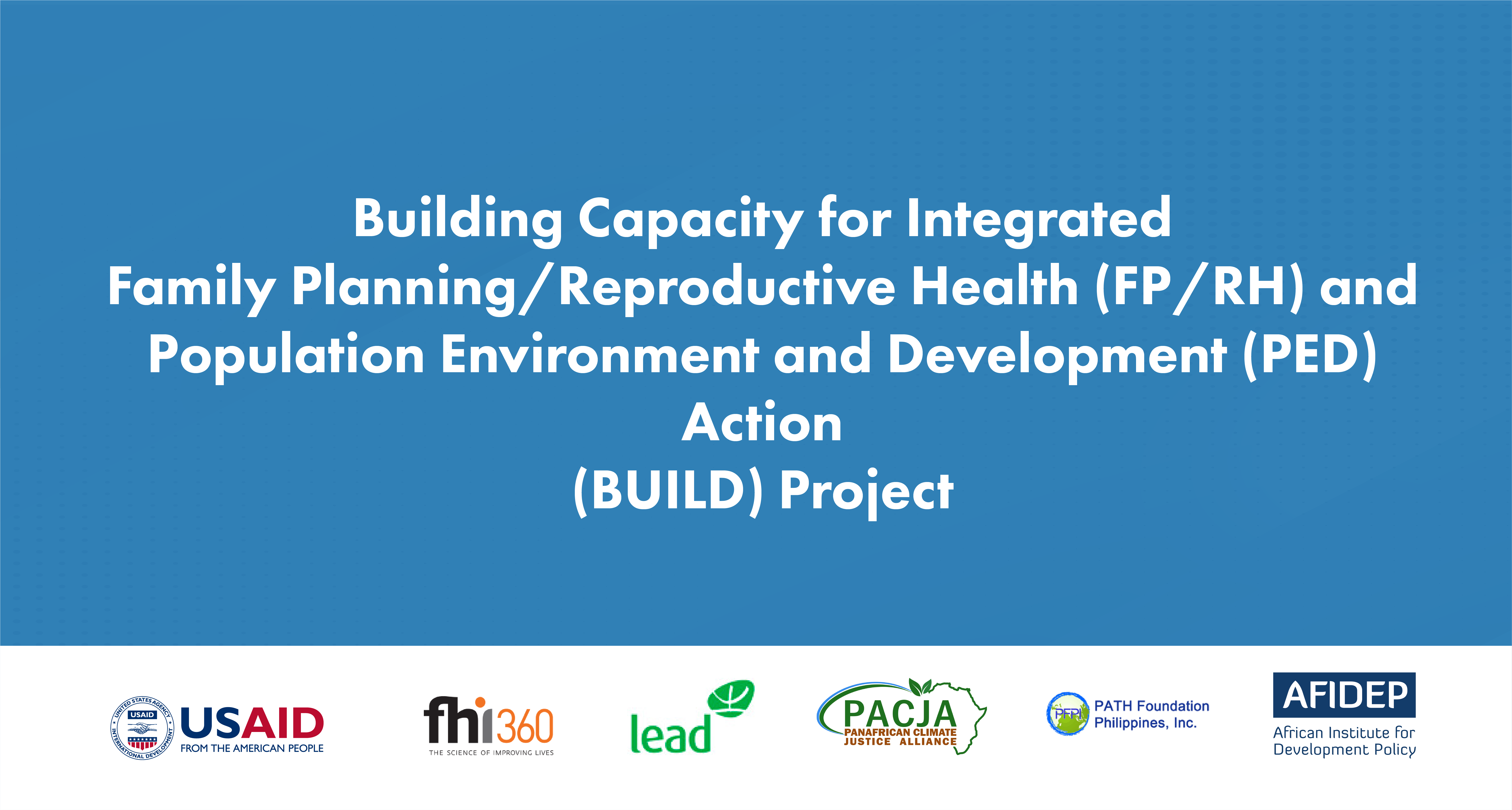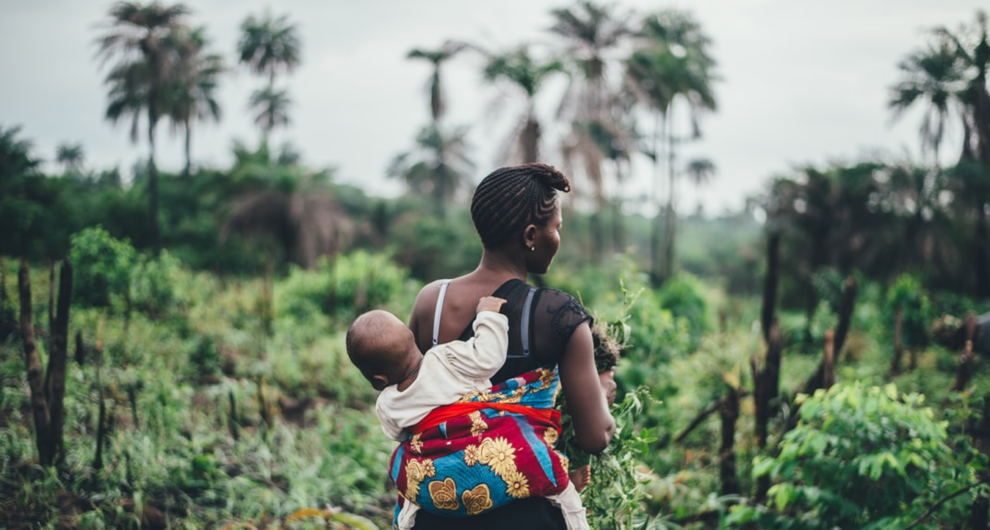Building Capacity for Integrated Family Planning/Reproductive Health and Population, Environment and Development Action (BUILD)



Building Capacity for Integrated Family planning (FP) and Reproductive Health (RH) and Population, Environment and Development (PED) Action (BUILD) is a global program designed to leverage the interconnectedness of Population, Environment and Development, to spur strong political commitment, sustained financial resources, and accountability for voluntary family planning and reproductive health in low-and middle-income countries (LMICs).
The BUILD Project recognizes that the underlying challenges that LMICs face: lacklustre economic development, environmental degradation, loss of biodiversity, high levels of unmet need for family planning, and rapid population growth are interconnected. Therefore, development interventions that fully tap into the synergies between population and environment are crucial to addressing root causes of poverty, preserving the environment, and stimulating the Sustainable Development Goals (SDGs).
Our analysis shows that countries with high population growth tend to have the most adverse climate change risks and poor resilience. The report calls for greater application of PED approaches to yield the triple wins envisaged in sustainable development that would concurrently reduce fertility and slow population growth, preserve natural resources and enhance the resilience of communities and countries to impacts of climate change, and improve the wellbeing of women, their families, and communities.
However, there is limited integration of population and environment policies and programs, and key players in the environmental sector rarely incorporate population interventions in their work. To address this, policymakers and other development practitioners in LMICs must acknowledge the Population-Environment-Development (PED) nexus as a valuable framework for strengthening local capacities and empowering governments and organizations to seek collective results through efficient utilization of scarce resources, and part of the recovery plan in crises, such as cyclones, flooding, drought, and deforestation.
The BUILD Project seeks to address interlinked Population, Environment and Development (PED) challenges for sustainable development in LMICs to enable integrated FP/RH and PED action using the Systems thinking approach.
Using a hub-and-spoke model, BUILD works in four countries in Africa and Asia: Côte d’Ivoire (West Africa), Kenya (East Africa), Malawi (Southern Africa), and the Philippines (South East Asia). The project will also be implemented in (scaled up to) other USAID FP/RH priority countries and Ouagadougou Partnership countries where the USAID missions provide field support for proposed activities.
|
Building Capacity for Integrated Family Planning/Reproductive Health and Population Environment Development Action (BUILD) is a five-year project made possible by the generous support of the American people through the U.S. Agency for International Development under cooperative agreement number 7200AA21CA00002. The BUILD project is led by the African Institute for Development Policy (AFIDEP) (prime) in partnership with Leadership for Environment and Development Southern and Eastern Africa (LEAD SEA); PATH Foundation Philippines Inc. (PFPI); FHI 360; and Pan-African Climate Justice Alliance (PACJA)
|
The BUILD Project seeks to strengthen individual and institutional capacity in advocacy, policy communications, and negotiations. BUILD’s interventions will be in 5 workstreams:
Workstream 1: Evidence Synthesis and Translation for PED Integration.
This aims at analysing existing evidence for interlinkages between FP, population dynamics, the environment and climate change, livelihoods, the economy, and governance.
Workstream 2: Policy reforms and institutionalization of PED.
This aims at strengthening the capacity of policymakers on Evidence-Informed Decision Making (EIDM) and Systems Thinking, with the ultimate goal of achieving policy reforms and mainstreaming of FP/RH and PED into the environment and other development policies.
Workstream 3: Empowering multi-sectoral PED champions for Voluntary FP/RH integration in policies and programs.
This aims at identifying, engaging and empowering new cadres of PED champions who will advocate for the integration of voluntary FP in the environment, governance, and development policies and programs.
Workstream 4: Partnership building among public, private institutions and communities.
This workstream aims at building new and strong cross-sectoral and multi-level partnerships among a wide range of actors from the public sector, the private sector and communities, to advance FP/RH and PED integrated approaches. These new partnerships that will provide a wide range of untapped expertise and community participation are necessary to increase commitment, and action for cross-sectoral PED approaches.
Workstream 5: Promoting south-south and regional exchange.
This activity aims to share knowledge and promote dialogue on evaluations and best practices of promising small-scale programs to grow commitment to implementing integrated, scalable and replicable cross-sectoral FP/RH and PED programs.
Capacity strengthening and strategies to increase gender equality and youth empowerment will be embedded in all project interventions. Specifically, the program will focus on building the capacity of women and youth groups on integrated FP/RH and PED, empowering them with advocacy, strategic communication and negotiation skills, and training their leaders as trainers (TOTs).
The BUILD project seeks to amplify the PED approach to a new degree of transformative action across disciplinary, geographical, socio-cultural and sectoral divides to achieve strong political commitment, sustained financial resources and accountability for voluntary FP/RH.
Result 1
Strengthened individual and institutional capacity in advocacy, policy communications and negotiations.
Result 2
Increased commitment for cross-sectoral PED approaches which integrate population, health, environment, climate change, resilience, food security, water, livelihoods, economic growth, education, demography and governance.
Underpinning the BUILD Project will be the Systems Thinking Approach and the Demographic Dividend theory, which we will deploy through the Drivers, Pressures, States, Impacts, and Responses (DPSIR) causal framework that is a powerful tool for demonstrating the interlinkages between society, the economy, governance, and the environment.
The BUILD Project brings together southern leadership and organizations from Africa, Asia, and the USA that, together, have proven technical expertise in promoting cross-sectoral interventions in Population-Environment-Development (PED) and in advocating for voluntary family planning (FP) and capacity strengthening.
- United States Agency for International Development (USAID),
- African Institute for Development Policy (AFIDEP),
- Leadership for Environment and Development Southern and Eastern Africa (LEAD SEA),
- PATH Foundation Philippines Inc (PFPI),
- FHI360,
- Pan-African Climate Justice Alliance (PACJA).
At the regional level, the BUILD Project will work with stakeholders on both the FP/RH, environment, and climate change sides and reinforce PED/PHE networks to expand the PED community practice. At national levels, the program will forge strong partnerships among policymakers, civil society organizations, and private sector actors to promote multi-sectoral approaches in development planning, financing and program implementation. The BUILD project will also encourage universities to review and broaden their curricula by embracing PED integration in the training of the next generation of PED experts.
Key Details
| Dates: | May 2021 to Present |
| Aim: | The BUILD program (Building Capacity for Integrated Family Planning/Reproductive Health and Population, Environment and Development Action) seeks to achieve strong political commitment, sustained financial resources and accountability for voluntary family planning and reproductive health.
BUILD is a 5-year program. |
| Where: | Africa , Côte d’Ivoire , Kenya , Malawi , Philippines |
| Project Director: | Clive Mutunga, M.A |
Éléments connexes
Warning: Invalid argument supplied for foreach() in /home/daqh5xy6fshq/public_html/wp-content/themes/afidep2019/sidebar-relateditems-programme.php on line 83
Événements connexes
Nov 2022
Aug 2022
Aug 2022
Aug 2022
Sep 2022
Oct 2022
Aug 2022
Jul 2021
Jun 2022
Nov 2021
Oct 2021
Aug 2021
Jul 2022

